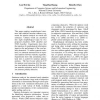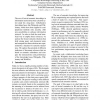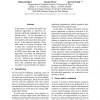143
Voted
EMNLP
2009
14 years 12 months ago
2009
We present a machine translation framework that can incorporate arbitrary features of both input and output sentences. The core of the approach is a novel decoder based on lattice...
112
Voted
EMNLP
2009
14 years 12 months ago
2009
119
click to vote
EMNLP
2009
14 years 12 months ago
2009
We present a scalable joint language model designed to utilize fine-grain syntactic tags. We discuss challenges such a design faces and describe our solutions that scale well to l...
107
Voted
EMNLP
2009
14 years 12 months ago
2009
This paper employs morphological structures and relations between sentence segments for opinion analysis on words and sentences. Chinese words are classified into eight morphologi...
134
Voted
EMNLP
2009
14 years 12 months ago
2009
The use of lexical semantic knowledge in information retrieval has been a field of active study for a long time. Collaborative knowledge bases like Wikipedia and Wiktionary, which...
118
Voted
EMNLP
2009
14 years 12 months ago
2009
Combining information extraction systems yields significantly higher quality resources than each system in isolation. In this paper, we generalize such a mixing of sources and fea...
112
Voted
EMNLP
2009
14 years 12 months ago
2009
In this work, we propose two extensions of standard word lexicons in statistical machine translation: A discriminative word lexicon that uses sentence-level source information to ...
116
click to vote
EMNLP
2009
14 years 12 months ago
2009
We have designed, implemented and evaluated an end-to-end system spellchecking and autocorrection system that does not require any manually annotated training data. The World Wide...
119
Voted
EMNLP
2009
14 years 12 months ago
2009
In this paper, we provide descriptive and empirical approaches to effectively extracting underlying dependencies among parsing errors. In the descriptive approach, we define some ...
98
Voted
EMNLP
2009
14 years 12 months ago
2009
Mitchell et al. (2008) demonstrated that corpus-extracted models of semantic knowledge can predict neural activation patterns recorded using fMRI. This could be a very powerful te...



